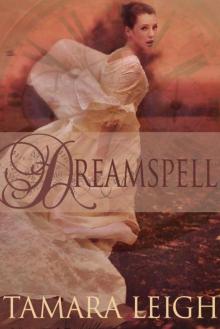- Home
- Tamara Leigh
THE RAVELING Page 9
THE RAVELING Read online
Page 9
Honore removed her girdle, but as she gathered up her skirt, the realization the veil and gorget must first be removed made her abandon the longing to shed the garment that was as much in need of laundering as her cloak.
“I pray you will forgive me should my gown sully your bedding,” she said as the lady returned to her, “but I prefer to remain clothed.”
“You are chilled?”
That too. “Oui, my lady.”
Though the woman’s smile reached her eyes, Honore saw it kept close company with suspicion. “Then you must retain your gown. Now beneath the covers you go.”
Sheet, blanket, and coverlet were drawn up to Honore’s shoulders. Though gloriously warm, it had no effect on her spasming throat and aching chest that once more set her to coughing of such strength she did not realize the lady had settled on the mattress edge.
“Pray, tell,” Lady Susanna said as Honore lowered the hand she had pressed over gorget and mouth, “how long have you been ill?”
Honore moistened her lips. Tasting the stained weave of the gorget, she longed to tear it off so she might breathe easier. “I took water into my lungs on the night past.” She cleared her throat to stave off another cough. “I am certain once I expel the last of it I shall be well.”
“You near drowned?” the lady exclaimed, then shook her head. “Speak no more. Rest is what you require, and methinks that best achieved on your side to more easily clear your lungs.”
Honore knew that but had not applied the good sense with which she believed herself gifted. It was as if only half her mind were present. A sign she was more ill than thought? Too fatigued to ponder it, she turned onto her side away from the lady and closed her eyes.
When a hand touched her shoulder and a soft voice said her drink had arrived, she nosed just enough above sleep to shake her head.
“It will be on the bedside table,” Lady Susanna said. “I shall return shortly.”
When thirst awakened Honore, it was still day. Or so she thought until her eyes adjusted and she saw light was thrown by candles and brazier coals. Sir Elias was yet in this place where his friend had given him a surname different from the one by which Honore knew him. Once more, curiosity plucked at her—until she was struck by the possibility the knight had departed, which was possible had she slept one night into the next.
Counseling calm though her heart vied to outrun the wind and rain besieging the shutters, she pushed to sitting and saw the cup on the table. Leaning back against the headboard, she retrieved it and was surprised it was warm, as was the liquid she gulped after snatching down the gorget. She understood, and it made her heart ache knowing just as she cared for her foundlings, someone cared for her. Lady Susanna had ensured the drink did not go cold. How many times had she replaced it?
Honore forced herself to sip and savor the honey- and mint-flavored water. When its last drop slid down her throat, she clasped the cup to her chest. For however long she had slept, it had done her good. Her chest ached, but not sharply.
“Thank you, Lord,” she whispered and dropped her head back and stared at the ceiling over which flame flickered. She would depart Cheverel with Sir Elias and join him in rescuing the children whom those without a conscience named peculiars and abominations.
“Dear Hart,” she whispered and hoped the strong, determined boy persevered and his faith sent its roots deeper and sprouted taller no matter what he endured.
“You shall see him again,” a voice preceded the one who rose from a chair to the right.
Honore gasped, looked to the Lady of Cheverel. Of less surprise than her presence was her choice of words that evidenced Sir Elias had revealed how Honore came to be in his company.
“I pray you are right. He is dear to me.” She set the cup on the table. “I thank you for keeping the drink warm. It soothed.”
Lady Susanna lowered to the mattress edge. “You feel better?”
“Oui, though still tired. Was I coughing much?”
“Several times I have come and gone these hours, and for a time you did, but less so of recent. Methinks you have cleared your lungs.” She put her head to the side, considered Honore’s face. “Your color is better.”
Honore touched her cheek, in the next instant clapped a hand over her mouth and reached for the gorget.
“Honore.” The lady touched the fingers tugging the material up from beneath her chin.
Honore turned her head opposite. “Pray, do not look!”
“Already I have looked, and methinks you make much of little.”
“Much?” Honore shrilled, then gave a cry of frustration when her attempt to reposition the gorget’s ties caused the veil to drop to her shoulders.
“I am sorry,” the lady said as Honore jerked the knotted ties into place. “I suppose it is not for me to say what is of no consequence, but I think it a small thing.”
The gorget once more taut beneath her nose, Honore closed her eyes. She was ashamed, not over how God had fashioned her and how another of his creation had tried to correct the deformity, but her reaction to the lady gazing upon that which many believed ought to remain out of sight.
“Forgive me.” Honore drew the veil over her head, saw understanding in the lady’s eyes. “I can never know who will look upon me with superstition and distaste and who will see…” She touched the gorget. “…only me.”
Lady Susanna inclined her head. “I am guessing Sir Elias does not know.”
“He does not, and I beseech you not to speak of it.”
“You misjudge him, Honore. Just as he is unconcerned the son he seeks bears a mark on his face, neither would he look ill upon you were he entrusted with knowledge of your injury.”
“It is no injury. It is as I was born—or was. Whilst yet a babe, an attempt was made to correct it.”
Was it distress passing over Lady Susanna’s face? Confusion?
Honore moistened her lips, wished for more drink. “I could hardly suckle. Had my lip not been repaired, I might not have survived.”
The lady nodded. “I have heard of children born with defects, but this one is unknown to me. My nephew was himself born with an affliction, though it is one rarely visible to the eye.”
As ever, Honore took interest in such talk that could aid with current or future abandoned children. Angling her body toward the woman, she said, “With what does he suffer, my lady?”
“A loss of breath. When Judas was young—”
“Judas?” Honore was certain she must have heard wrong.
“That is his name. And that is another tale.”
“Forgive me. It is just that only in the Bible have I heard the name given.” Thinking she made matters worse, she repeated, “Forgive me.”
“Worry not. It is a name little known in England.”
Who would be so cruel to strap the name of Jesus’s betrayer to the back of an innocent boy? Honore wondered. As much as she longed to know the answer, she said, “Tell me about his breathing difficulty.”
“When young, so often did he lose his breath I feared he would suffocate and not grow to manhood.”
Honore had experienced such with one foundling. It had been frightening but of little threat to the child’s life. “And now?”
“The more years he gains, the less severe the attacks, and when they strike he knows what is required to quickly recover.”
“I am glad. Life is difficult enough without providing the heartless another means of making themselves feel superior.”
“You speak true.”
After an awkward silence, during which curiosity over Elias’s name returned, Honore said, “My lady, your husband called Sir Elias by the surname Cant. Is it not De Morville?”
Her mouth curved. “It is, but for a time he was known by Cant—a darker time than this best told by him.”
Then likely she would never hear it, but there was another curiosity to which the lady might give answer. “Is Sir Elias wed?”
A question sparkled in the lady�
�s eyes. “Though much his father wishes it for the sake of the family name, he is not. But methinks he must yield soon.” She stood. “I shall go for viands.”
“I thank you, but I am not so hungry I would rather fill my belly than sleep.” Honore frowned. “Know you what hour it is?”
“I would say two until middle night.”
“You ought to be abed yourself.”
“As I am assured you are recovering, there I shall go—after I deliver a tray for when you are ready to eat.”
Hating she further delayed the lady’s rest, Honore wanted to decline but said, “I would like that though the drink need not be warmed.”
“Already it is. A large pot was made for all and left over a warming fire.”
Honore caught her breath. “Have others taken ill? Cynuit? Squire Theo? Sir Elias? Your son?”
“Worry not, all are well.” With a rustle of skirts, the lady crossed to the door.
“Lady Susanna, you will not tell Sir Elias of my mouth, will you?”
The woman looked across her shoulder. “I will not, but may I ask what you fear?”
“It may be true I misjudge him, but there are others I did not believe would turn from me when they saw the Lord shaped me differently, yet they did. As for Sir Elias, I fear he would desire my company even less since some believe ill luck befalls those who travel with ones whose bodies appear formed by the devil.”
“You speak of superstition, Honore. Sir Elias—”
“Still,” Honore gently interrupted, “I would not risk it. Pray, grant me this.”
The lady inclined her head. “I shall leave the matter be and pray Sir Elias is not long in proving worthy of your confidence.”
“I am grateful, and if you will bear with me, one more thing I would ask. If Sir Elias determines I am not sufficiently recovered to accompany him on the morrow, do not let me sleep though his departure. I would speak with him before he leaves.”
“The boy means much to you.”
“He does. I love all those with whom the Lord entrusts me, but methinks Hart is as near a son as ever I shall have. I would see him one last time and be assured as much as possible his life will be good.”
“Then if the storm passes, I shall awaken you.”
“I am grateful, my lady.”
A lovely smile, then the woman was gone. Though Honore tried to wait for her to return with drink and viands, sleep was too persuasive.
Chapter 14
THOU WILL NOT FIND
I do not argue the necessity of rescuing the boy,” Everard said where he stood alongside Elias inside the hall, the manor doors open before them. “I would do the same, but do you continue your pursuit in weather like this”—he jutted his chin at the rain-soaked sky—“your chance of success is seriously jeopardized. Stay and be comforted knowing Arblette must also shelter until the storm passes.”
No rising sun to be seen across early morn, Elias shifted his jaw. “Already he has many leagues on me, mayhap enough he is beyond this foul weather.”
“I think not, Elias. That storm smells of conception on the sea and birth upon the coast. Were I my brother, Abel, I would wager all travel along the eastern coast crawls.”
As would Elias, but despite hours of prayer on the night past that made his eyes gritty, teeth throb, and throat ache, little peace had he found amidst the interruptions to which he subjected himself.
Whilst kneeling before the Lord, memories of what had transpired in the wood jostled him—flashes of Honore face down in the water, Lettice hung from a rope, inappropriate familiarity with one he had no cause or right to be attracted to. Then there were imaginings of the children being exploited by the troupe. And revenge.
When he ought to have prostrated himself, his arms had quaked with the force of bunched fists. He knew he should not make decisions with such emotions coursing his blood, but the peace required to temper his feelings remained elusive.
“Stay,” Everard said.
Elias shifted his regard to the warrior. “If France is Arblette’s destination and he hunkers down to wait out the storm, once it passes he will take the first boat across the narrow sea. Thus, I need these hours to gain on him lest he reaches the troupe first and takes Hart, leaving me no trace to follow.”
“I understand, but I also know you will be of little use to the boy if this weather proves your undoing.”
“It will not. Do I leave the woman and boy, this day Theo and I can cover many leagues.”
Everard’s brow lowered. “Providing you do not lose your way whilst rain falls so thick you can hardly see the land before you. Providing your horse does not stumble and break a leg—and your neck. Providing you do not turn ill from a drenched body. Providing you choose the same port by which Arblette departs England. If he departs.”
Argument shot through Elias, but a voice within made itself heard over the churn of blood. Until you can submit heart and mind to the Lord, let this warrior—your friend—be your peace.
He exhaled sharply, nodded. “I wish you were wrong.”
“As do I. Now let us talk of other things.” Everard closed the doors and returned to the hearth where they had broken their fast with sweet white bread and goat cheese.
“How goes the training at Wulfen?” Elias asked as he dropped into a chair.
“Intense as ever.” Everard stretched his legs out before him. “And more work it is now all three brothers are rarely in residence at the same time.”
Elias raised an eyebrow. “Is that regret?”
“Some.” Everard smiled. “But for naught would I exchange my life with Susanna for life before. She is what it means to be complete—to be alive beyond the draw of breath and the trudge of days.”
Elias was surprised he could laugh without reminding himself to do so as done whilst giving tale of the events at Forkney to Everard and his son. Amid this current darkness, it seemed Elias Cant could still be found. “You sound a poet, my friend,” he mused.
“Susanna again. That two become one in marriage are not merely pretty vows. She composes words of love for me and our son—in ink, wax, dust, and upon the air. As for my effect on her, she may not be sword-wielding Lady Annyn, but the greater our days together, the more fierce she becomes. Woe to any who think to make sport of those she holds dear.”
Elias had seen it himself. The desperate, emotionally abused lady whom he had aided in fleeing Cheverel with her nephew no longer existed, the sorrow of her slain by love. The thought lightened Elias as he mused only love ought to have the power to slay.
“You are smiling,” Everard said.
So he was, and it seemed wrong so near Lettice’s death. Easing the curve of his mouth, he asked, “How fare Garr and Abel? Their wives and children?”
“As blessed as I. I think there will be no shortage of Wulfriths for years to come.”
“Let us pray never. Certes, it is as your king and queen do.”
Everard inclined his head. “Now they have our family’s support.”
As once they had not, Elias reflected. “Who lords Wulfen Castle now?”
“Abel that I shall be at my lady’s side when she gives another son or daughter into my arms.”
Elias quaffed the remains of his ale, asked, “How goes Baron Soames’s training? Has he proven Wulfen worthy?”
“More and more. Though Abel was averse to instructing him and displeased when I determined that were the offer made—no matter it was but a taunt—it must be honored, methinks he has taken a liking to the baron. Not that he would admit it.”
That surprised. Soames had been a party to drugging Elias so the baron could wed Lady Beata against the queen’s wishes. Thus, Elias had no great liking for Soames, even though that marriage had been annulled and Queen Eleanor had arranged for him to wed another. Hoping his wife was not miserable—that Soames was Wulfen worthy—Elias thanked the Lord that King Henry’s wife had yet to seek a match for him as Elias’s father would be pleased for her to do. But if Elias did not
soon wed one of his own choosing…
He closed his eyes. Of such things he should not ponder following the loss of one he had loved and would have wed had she been faithful. He nearly spoke her name, but the sense of being watched returned his regard to Everard.
“Truly,” his friend said, “I am sorry for your loss. It is one kind of ache to lose a woman to another man, a more terrible one to lose her to death.”
Elias could not be offended. Everard had experience with the same, though his first love had not suffered the violence to which Lettice had been subjected. Everard had shared that tale some time ago, honoring Elias with friendship of a strength he could be entrusted with something so private.
Susanna had said that, providing Elias was judicious, only occasionally dipping beneath the surface of the Wulfriths, the troubadour knight could serve as the family’s tale bearer. And so he did when he had occasion to entertain their family and others in need of lighter hearts. Much remained beneath the surface, but when he dipped he was careful to change certain names and places. Perhaps with the Wulfrith’s permission, one day he would write what could be called The Book of Wulfrith. Though hard to believe such a family would fade across the centuries, parchment and ink would ensure they were not forgotten.
“Where have you gone, Elias?”
Everard’s question made him sit forward. “Respite only, and refreshing it was.”
“Doubtless, you slept poorly on the night past.”
Could it be called sleep, Elias thought. “So I did, but I am not so tired I could not further entertain were I called upon.”
“Another tale would do us good.”
Sensing tension about Everard that had hovered just out of reach until that moment, Elias said, “Something is amiss?”
Silence.
“I would not presume to be your confidant, Everard, but do you wish to speak, you have my ear and my aid.”
Just when Elias determined the private Everard would tell no more, the man said, “The Wulfrith siblings may number beyond five.”
“What?”
Everard nodded. “It could be false, but Garr fears not.”

 FEARLESS: Book Two: Age of Conquest
FEARLESS: Book Two: Age of Conquest BOUNDLESS: A Medieval Romance (AGE OF CONQUEST Book 6)
BOUNDLESS: A Medieval Romance (AGE OF CONQUEST Book 6) Lady Betrayed
Lady Betrayed Merciless
Merciless Nowhere, Carolina
Nowhere, Carolina Virgin Bride
Virgin Bride Blackheart
Blackheart Restless in Carolina
Restless in Carolina THE AWAKENING_A Medieval Romance
THE AWAKENING_A Medieval Romance Baron of Blackwood
Baron of Blackwood Leaving Carolina
Leaving Carolina HEARTLESS: A Medieval Romance (Age of Conquest Book 4)
HEARTLESS: A Medieval Romance (Age of Conquest Book 4) Baron of Godsmere
Baron of Godsmere Lady Of Eve
Lady Of Eve LAWLESS: A Medieval Romance (AGE OF CONQUEST Book 7)
LAWLESS: A Medieval Romance (AGE OF CONQUEST Book 7) Lady Of Fire AKA Pagan Bride
Lady Of Fire AKA Pagan Bride The Yielding (Age of Faith)
The Yielding (Age of Faith) The Redeeming: Book Three (Age of Faith)
The Redeeming: Book Three (Age of Faith) LADY UNDAUNTED: A Medieval Romance
LADY UNDAUNTED: A Medieval Romance THE RAVELING: A Medieval Romance (Age of Faith Book 8)
THE RAVELING: A Medieval Romance (Age of Faith Book 8) LADY EVER AFTER: A Medieval Time Travel Romance (Beyond Time Book 2)
LADY EVER AFTER: A Medieval Time Travel Romance (Beyond Time Book 2) Dreamspell
Dreamspell The Unveiling (Age of Faith)
The Unveiling (Age of Faith) THE RAVELING
THE RAVELING Splitting Harriet
Splitting Harriet Age of Faith 4 - The Kindling
Age of Faith 4 - The Kindling THE RAVELING_A Medieval Romance
THE RAVELING_A Medieval Romance Perfecting Kate
Perfecting Kate Misbegotten
Misbegotten THE VEXING: A Medieval Romance (AGE OF FAITH Book 6)
THE VEXING: A Medieval Romance (AGE OF FAITH Book 6) LadyOfConquest:SaxonBride
LadyOfConquest:SaxonBride